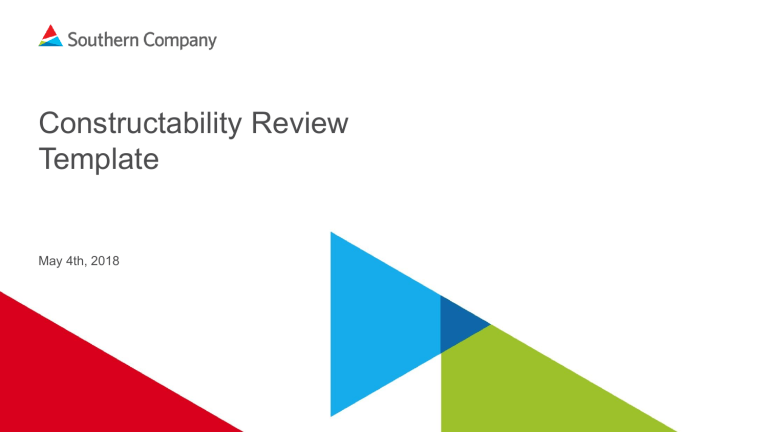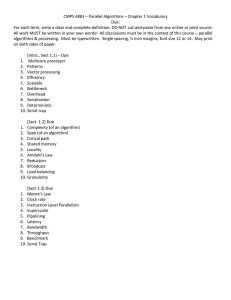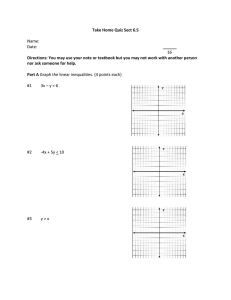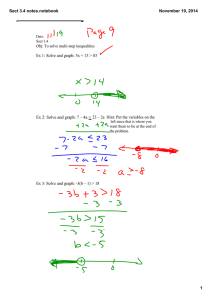
Constructability Review Template May 4th, 2018 Constructability Review Content What is constructability? Constructability is defined as “The optimum use of construction knowledge and experience in planning, design, procurement, and field operations to achieve the overall project objectives.” (Constructability: A Primer, 1986) 2 Constructability Review Content What is the constructability review (CR) process? The Constructability Reviews are a series of meetings to confirm the project direction is progressing as planned by the project team through the optimum use of construction knowledge, methodology, and experience. Our guideline consists of 20 attributes. Constructability Reviews will present with the latest and best available information. • CR1 shall include information for attributes 1 through 10. • CR2 will include information for attributes 1 through 20 but with a recap on the information for attributes 1 through 10. • During CR1, if information is available for an attribute listed for CR2, that information will be included with CR1. • An attribute for which there is no information available will not be included in the CRs. A notation shall be made that no information is currently available. 3 Constructability Review Content Constructability Review 1 & 2 1. Constructability Assessment 2. Modularization, Pre-fabrication, & Pre-assembly 3. Project Safety Plan 4. Site Improvement Plan and Logistics 5. Construction Equipment Access 6. Heavy Haul/Lifting Plan 7. Impacts to Existing Facilities 8. Project Installation Risk Assessment 9. Construction Work Package List 10. Permitting Requirements Constructability Review 2 11. Installation Contracting Methodology 12. Installation QA/QC Plan 13. Security Plan 14. Outage Work Integration Plan 15. Construction Management Plan 16. Construction Installation Estimate 17. Project-Specific Craft Labor Availability Study 18. Craft Worker Productivity Improvement 19. EPC Summary Level Schedule 20. Post-Construction Site Restoration Plan Constructability Reviews are a necessary step in our Project Delivery Process and are an opportunity for the project team to share information from many specific areas on the complete work plan and identify any concerns and action items. This is an interactive presentation with an emphasis on the “how” of the project and we encourage any productive comments, questions, or clarifications. Most issues that come up during a review will require additional conversations and additional resources, so we will identify them as action items and assign to team members to follow up. 4 Part 1 Sect. 1 - Constructability Assessment Deliverables: • Scope overview statements. What will the project achieve for the plant? How will it be achieved? • Work scope list. Major scope of work such as heavy earth moving and duct removal and replacement. Pictures, model shots, drawings, and related items for each phase of the project shown in sequence of construction. Discussion of significant challenges with any or all of the scope items. • Summary statements. Safety. Normal means and methods. Special considerations for this project. Scope. Normal scope items, means, and methods. Special scope and other considerations. Quality. Normal means and methods. Special considerations. Risk. Normal risks associated with a project of this type. Unusual risks requiring special means of mitigation. Constructability considerations for: Operations. Maintenance. Design. Construction. 5 Part 1 Sect. 2 - Modularization, Pre-fabrication, and Pre-assembly Deliverables: (Similar for CR1 and CR2 based on best available information) • Modularization, Prefabrication, and Preassembly statements: List of work to be modularized, prefabricated, or preassembled. Pictures, model shots, drawings, and so forth showing planned optimization. Anticipated benefit or drivers from optimization: Cost. Schedule. Others of significance. Significant challenges with optimization. • Modularization, prefabrication, and preassembly checklist. 6 Part 1 Sect. 3 - Project Safety Plan Deliverables: CR1: High level risk assessment that identifies scope hazards outside of core business (CR1). List of identified scope hazards. CR2: Perform EH&S procedures gap analysis and identify need for new procedures. List any new procedures required. Statement on the development of the safety manual implementation plan: Normal implementation means and methods. Project specific means and methods. 7 Part 1 Sect. 4 - Site Improvement and Logistics Deliverables: • Site improvement plan and logistics statements: Site: Aerial photos, site plans, and general arrangement drawings. Significant features. Safety considerations. Optimized for travel, transport, and wait times. Coordinated with plant operations and maintenance. General work areas: Aerial photos, site plans, and general arrangement drawings. Significant features. Safety considerations. Optimized for craft travel, transport, wait times, and productivity. Coordinated with plant operations and maintenance. Crew work areas: Aerial photos, site plans, and general arrangement drawings. Significant features. Safety considerations. Optimized for craft travel, transport, wait times, and productivity. Coordinated with plant operations and maintenance. 8 Part 1 Sect. 5 - Construction Equipment Access Deliverables: • Construction equipment access statements: Identify each characteristic for overall site, general work areas, and crew work areas. Close-in aerial photos, site plans, and general arrangement drawings. Specific locations. Haul routes to and from the site. Local temporary laydown and staging areas. Fueling considerations. Plant interfaces. 9 Part 1 Sect. 6 - Heavy Haul/Lifting Plan Deliverables: • Heavy haul or lifting plan statements (300 T-rated crane or specialty lifts): Haul path: o Obstructions. o Underground facilities. o Ground preparation. Haul plan: Objects. Equipment type and configuration. Crane pad: Obstructions. Underground facilities. Ground preparation. Lift plan: Lift objects. Crane location and layout. Crane configuration. Operating radii drawing. Load charts. Special rigging considerations. Special lifting equipment: Lift objects. Equipment location and layout. Equipment configuration. Lifting layout. Load charts. Special rigging considerations. 10 Part 1 Sect. 7 - Impacts to Existing Facilities Deliverables: • Impacts to existing facilities statements: Demolitions. Relocations. Modifications and upgrades: Temporary. Permanent. Accommodations: Temporary. Permanent. 11 Part 1 Sect. 8 - Project Installation Risk Assessment Deliverables: • Project installation risk assessment statements: List of risks ranked by severity (high to low). Brief statement on nature of major risks. List of mitigation strategy for major risks. 12 Part 1 Sect. 9 – Construction Work Package List Deliverables: CWP Framework List (Rev A) – the list of CWPs for a project created prior to CR1 that shows one CWP per CWP type for project scope within an area. This list is a binary indicator of construction scope within an area. CWP List (Rev 0) – the refined list of CWPs for a project created prior to CR2. If the IPP core team has decided that a single CWP needs to be broken into multiple CWPs within the same area, this list can show multiple CWPs of the same CWP type per area. This list is a more detailed overview of construction scope within an area. 13 Part 1 Sect. 10 – Permitting Requirements Deliverables: • Permitting requirement statements: Permitting matrix. Integration into level 2 schedule. Permitting risks. How timing of permits affects the contracting strategy. 14 Part 2 Sect. 11 – Installation Contracting Methodology Deliverables: Installation contracting methodology statements: Independent contract packages: Lump sum/T&M/Unit price/Other. 15 Part 2 Sect. 12 – Installation QA/QC Plan Deliverables: Installation QA/QC plan statements: Quality implementation process meets or exceeds: • E&CS basic quality plan. • Volume 5, Construction Quality Assurance Manual, Quality Control Procedures. Construction plans: • OR-01: Quality requirements for work to be performed by Construction Services. • CO-03: Used by Construction Services personnel who interact with contractors and oversee the contractor’s quality program. CQR-1: Identifies the minimum Quality Program requirements for a contractor who is providing equipment, material, and/or construction services for E&CS construction sites. • Plant’s site specific requirements, if any. • Any special requirements related to the site or Scope of Work such as welding of specialty metals. 16 Part 2 Sect. 13 – Security Plan Deliverables: Security plan statements: Plant based: • Existing without enhancements. • Existing with enhancements. Project based • Construction entrance. • Security staff and equipment. • Other features Significant security features. 17 Part 2 Sect. 14 – Outage Work Integration Plan Deliverables: Outage work integration plan statements: • Scope of work. • Schedule for work. Integration with plant outage: • Scope. • Schedule. • Logistics. 18 Part 2 Sect. 15 – Construction Management Plan Deliverables: Construction Management plan statements: Organization charts: • FTEs. • Supplemental staff. • Other E&CS groups. Staffing plan schedule. Facilities: • Existing. • Newly established. Cost: • Labor. • Temporary construction. • Total. • Craft workhours. • Average $/workhour. 19 Part 2 Sect. 16 – Construction Installation Estimate Deliverables: Construction installation estimate statements: Total estimate EPC. Construction estimate summary: Total construction cost. Taxes + owner’s material. Total estimate, including taxes. Direct construction cost: Labor. Material. Subcontracts. Total. Direct labor: Direct labor hours. Average W2 wage. Average W2 wage with burdens and benefits. Per-diem. Labor productivity factors for major quantities: Productivity factor basis: • Historical from similar projects. • Crew and work hour basis. • Combination. Productivity factors. • Lf of cable, tn of steel, lf pipe, cy soil, etc. 20 Part 2 Sect. 17 – Project-Specific Craft Labor Availability Study Deliverables: Project-Specific Craft Labor Availability Study: Demand by craft. System. Regional. Site: • E&CS contractors. • Plant contractors. • Transmission contractors. Skilled labor risk assessments (pain point charts). Labor availability mitigation strategies: Broader geographical reach. Craft use flexibility (use of alternative trades where appropriate). Increased composite crew use. Supplemental non-union workers (union projects). Specialty contractors. Schedule adjustment. Temporary compensation adjustments. Others. 21 Part 2 Sect. 19 – Construction Summary Schedule Deliverables: Level 2 EPC schedule statements: • 1 page summary level schedule. • Incorporates current contracting strategy. • Significant milestones. • Significant critical items. • Correlation with plant outage schedules. 22 Part 2 Sect. 20 – Post-Construction Site Restoration Plan Deliverable: Post-construction site restoration plan statements: Listed items: • Site. • Buildings. • Equipment. • Laydown yards. • Temporary roads. • Removals. • Others. 23 Template Questions, Comments and Action Items 24


